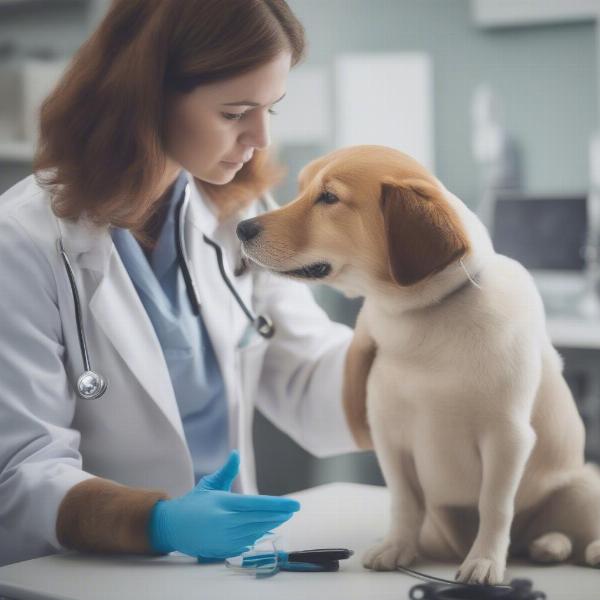IAMS low fat dog food is formulated to help dogs maintain a healthy weight and manage specific health conditions that require a low-fat diet. This guide will delve into the benefits, considerations, and frequently asked questions regarding low-fat dog food, with a special focus on the IAMS brand. We’ll explore who can benefit from this type of diet, how to choose the right formula, and what to look for in a quality low-fat dog food.
Understanding the Need for Low-Fat Dog Food
Some dogs require a low-fat diet due to health issues like pancreatitis, hyperlipidemia, or gallbladder problems. These conditions can be exacerbated by high levels of fat, leading to inflammation and discomfort. Low-fat diets can also aid in weight management for overweight or obese dogs. By reducing fat intake, these diets can help dogs shed excess pounds and improve their overall health and mobility.
Choosing the Right IAMS Low Fat Dog Food
IAMS offers a range of low-fat options designed to meet different dietary needs. When selecting an IAMS low-fat formula, consider your dog’s age, breed, size, and specific health conditions. Consult your veterinarian for personalized recommendations. They can help you determine the appropriate fat content and other nutritional requirements for your dog’s individual circumstances.
Benefits of IAMS Low Fat Dog Food
IAMS low-fat dog foods are formulated with high-quality ingredients and are designed to be easily digestible. They typically contain lean protein sources, moderate amounts of carbohydrates, and a reduced fat content. This combination helps to support healthy weight management, improve digestion, and promote overall well-being.
Transitioning to IAMS Low Fat Dog Food
When switching to a new food, especially a low-fat diet, it’s crucial to introduce it gradually. Start by mixing a small amount of the new food with your dog’s current food. Gradually increase the proportion of the new food over several days to a week. This gradual transition helps prevent digestive upset and allows your dog to adjust to the new taste and texture.
Monitoring Your Dog’s Health
Regular veterinary checkups are essential for dogs on a low-fat diet. Your veterinarian can monitor your dog’s weight, bloodwork, and overall health to ensure the diet is effective and address any potential issues. This ongoing monitoring helps to maintain your dog’s well-being and make any necessary adjustments to their diet.
 Veterinarian Examining Dog
Veterinarian Examining Dog
Conclusion
IAMS low fat dog food can be a valuable tool for managing various health conditions and supporting weight loss in dogs. By understanding your dog’s specific needs and choosing the right formula, you can help them achieve and maintain a healthy weight and improve their overall quality of life. Always consult your veterinarian before making any dietary changes.
FAQs
-
What are the signs of pancreatitis in dogs? Vomiting, diarrhea, loss of appetite, lethargy, and abdominal pain are common signs.
-
How much IAMS low-fat food should I feed my dog? Follow the feeding guidelines on the packaging and consult your veterinarian for personalized recommendations.
-
Can I supplement my dog’s low-fat diet with treats? Choose low-fat treats and give them in moderation to avoid exceeding the recommended daily fat intake.
-
Is IAMS low-fat dog food suitable for all breeds? While generally safe, consult your veterinarian to ensure it meets your dog’s specific breed-related needs.
-
What are the long-term benefits of a low-fat diet for dogs? Improved weight management, reduced risk of pancreatitis and other health issues, and increased mobility are some long-term benefits.
-
How can I make the transition to low-fat food easier for my dog? Gradual introduction and mixing the new food with the old can help ease the transition.
-
Are there any potential side effects of a low-fat diet? Some dogs may experience digestive upset initially, but this usually resolves with a gradual transition.
ILM Dog is your trusted resource for all things canine. We offer expert advice and practical information on dog breeds, health, training, nutrition, grooming, and much more. From selecting the right breed to managing specific dietary needs, ILM Dog provides comprehensive guidance to help you provide the best possible care for your furry friend. Contact us for personalized support: Email: [email protected], Phone: +44 20-3965-8624.